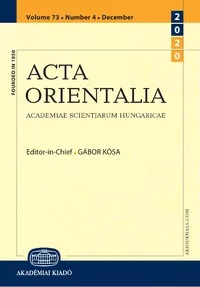Unedited Old Uighur Buddhist Literature Preserved in the National Museum of China: the Mahāpratisarā dhāraṇī and ‘On the Three Qualities’
Unedited Old Uighur Buddhist Literature Preserved in the National Museum of China: the Mahāpratisarā dhāraṇī and ‘On the Three Qualities’
Author(s): Ma FuSubject(s): Cultural history, Other Language Literature
Published by: Akadémiai Kiadó
Keywords: Old Uighur; Buddhist literature; Mahāpratisarā; dhāraṇī; National Museum of China; Huang Wenbi
Summary/Abstract: Two Old Uighur manuscripts housed in the National Museum of China have remained unidentified and unedited since their discovery by Huang Wenbi in 1928–30. A philological study based on examination of the originals is given in this paper. The first manuscript, a fragmentary codex with seven folios, can be identified as an Old Uighur transcription of the dhāraṇī text belonging to the Sanskrit Mahāpratisarā Mahāvidyārājñī. It may have served as a handbook for Uighur Buddhist monks or practitioners to recite the dhāraṇī in public ritual or private practice. The reconstructed Vorlage demonstrates a close relationship with the Tibetan and Tangut versions. A group of blockprint fragments in the Pelliot Collection from Dunhuang can also be identified as coming from the same text. The second manuscript, with 30 lines of text, belongs to a thus far unknown Old Uighur Buddhist treatise related to the qualities conducive to the attainment of ‘entrance into the stream’ (srotaāpattyaṅga) in Buddhist spiritual practice. It is likely a commentary composed by Uighur Buddhists.
Journal: Acta Orientalia Academiae Scientiarum Hungaricae
- Issue Year: 75/2022
- Issue No: 4
- Page Range: 563-592
- Page Count: 30
- Language: English
- Content File-PDF

